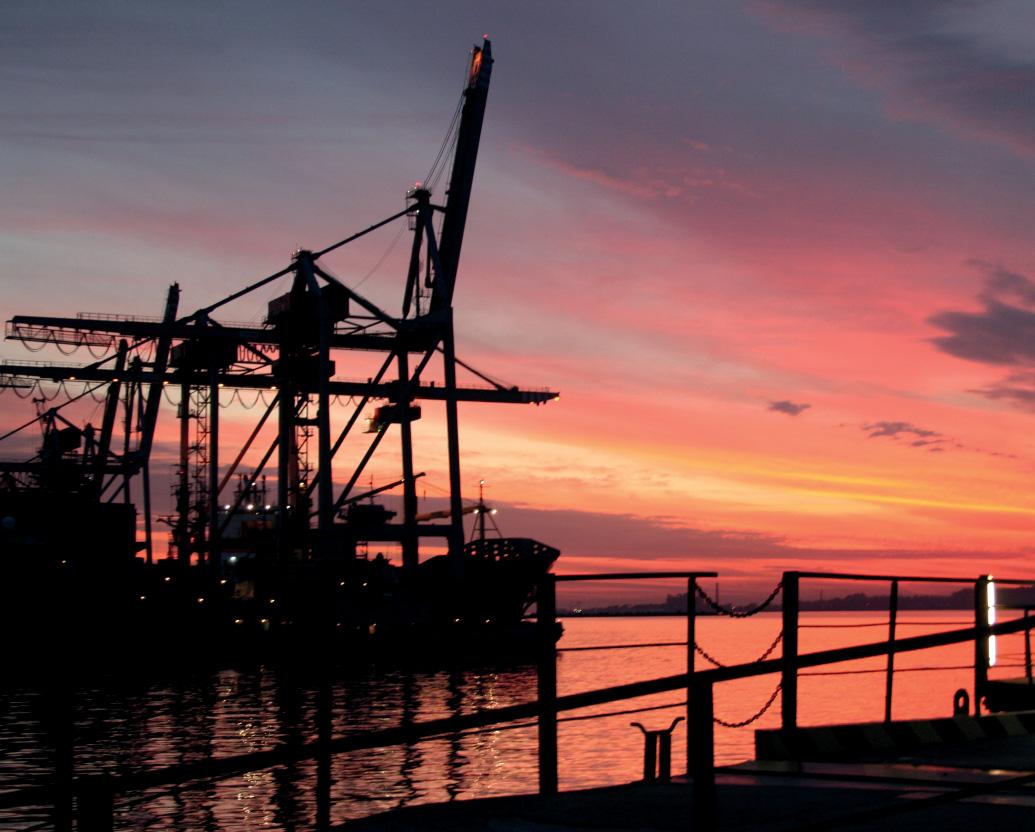
10 minute read
Hub Hopes
MONTEVIDEO HUB HOPES
With priority now established for TCP in container handling and Paraguayan transshipment returning the ambition is to establish Montevideo as the leading regional hub
Having ditched its legal challenge against the Uruguayan government Terminal Cuenca del Plata (TCP) is gearing up for a massive US$455 million investment programme over the next few years which will, TCP’s management hopes, catapult the facility into becoming THE hub port for the River Plate, as well as southern Brazil,
The Katoen Natie (Belgium) controlled container terminal, had begun the process of suing the Uruguayan government despite, ironically, the state-controlled entity, the Administracion Nacional del Puertos (ANP, or National Port Administration) holding a 20 per cent stake in TCP.
Although Katoen Natie opened for business in Montevideo back in 2001, on the understanding that it would be a “dedicated box terminal” and the main container facility for the Uruguayan capital, Montecon, the user of the public berths, has been handling more boxes than TCP since late in 2015, much to the chagrin of TCP and Katoen Natie.
During 2020 Montevideo as a whole handled 765,000TEU with Montecon taking 57.4 per cent of the containers, and TCP a relatively miserly 43.6 per cent. That figure is 22.7 per cent down from the record 940,000TEU handled in 2017.
“We have been complaining that in recent years the Port Law has not been applied in the way it was initially envisaged when we signed up for the tender in the first place [more
than 20 years ago],” says Gonzalo Hontou, Commercial Manager for TCP; which will now have priority for all box vessel calls and will oversee the gradual transfer of four remaining deep-sea calls from Montecon to TCP.
Montecon view the situation through a very different lens and are asking the Uruguayan government to “strongly reconsider” its agreement with TCP as it has created a “virtual monopoly” and is to the detriment, not the benefit, of carriers and especially of shippers.
“We believe this latest development [which takes away regular carrier calls to Montecon] goes against the Uruguayan Port Law and we are currently in a legal process regarding this issue,” a Montecon manager told Port Strategy. “I am not a lawyer but a monopoly situation is not allowed under Uruguay’s constitution. Over the next few months, the Transport Minister [Luis Alberto Heber] will address Parliament with, we hope, some alternative suggestions.”
In the meantime, the world of commerce keeps moving and Uruguay is a centralised country with the vast majority of its foreign trade passing through Montevideo, and 90 per cent of the port’s cargoes containerised. It is also a transshipment hub for Paraguay and Argentina, plus occasionally southern Brazil.
More infrastructure and equipment are now needed to handle the expected future rises in economic activity post
8 By mid-
September it is estimated 70 per cent of Paraguayan transshipment will have re-crossed the River Plate back to Montevideo
COVID-19 and also the imminent return of Paraguayan transshipment cargoes: which will total around 100,000 to 120,000TEU extra per annum.
During the first six months of this year provisional figures show that Montevideo handled around 431,600TEU, up a hefty 31 per cent compared with the same period of 2020, with the percentage share of the market roughly the same as last year, but all those interviewed for this article believe that percentage share is about to shift radically back towards TCP, unless politicians do a volte face.
Hontou explained to Port Strategy that although the new concession runs now until 2081 – and is therefore believed to be one of the longest running in the world today - such are the needs for infrastructure in Montevideo today, that Katoen Natie will front-load nearly all the investments into the next few years.
“We are hoping to start breaking the first rocks almost immediately,” Hontou told Port Strategy whilst referring to a new quay, of 740 metres, that will be built as part of the US$455million investment commitments, and take total quay length up to 1380 metres, allowing for four vessels to be operated simultaneously.
“We are going to make all the infrastructure investments over the next few years not spread them out long term.”
At the end of the investment TCP will be deploying between 12 and 15 Super Post Panamax Ship to Shore Gantry Cranes (SSGCs), up from the six they operate today (four super post Panamax and two post Panamax).
“We will need to make these investments so we can handle the forecast increases over the coming years,” he explains. “Already the Paraguayan transshipment cargoes we lost to Buenos Aires are starting to come back and we will slowly be taking in more of Montecon’s volumes as the new agreement with the government takes hold.”
Montecon still has four services remaining - CMA CGM’s ESA service to the Far East, two MSC and Hapag Llloyd joint services to the Med and to North Eruope plus the Hapag Lloyd dominated GS 1 to the US Gulf – but one of those is expected to transfer to TCP in early October.
Hontou adds that soon after Montecon’s volumes superseded those of TCP, the overall throughput for Montevideo (which peaked in 2017 with 940,000TEU) started to plummet as more than 100,000TEU per annum of Paraguayan transshipment cargo started to shift across the River Plate to the terminals of Buenos Aires. The 2020 figure was some 22.7 per cent behind that peak year of 2017 but many believe the 1m TEU barrier will be breached within three years, thereby underlining the urgent need for improved infrastructure.
The 2017 record figure fell by 15 per cent in 2018, and by another six per cent in 2019, but it rose by two per cent during 2020 despite the pandemic dislocations, partly because of operational problems in Buenos Aires and weather and other delays in North Europe meant that carriers were offloading some cargoes in Monty and skipping their BA calls, and sometimes calls in Rio Grande, Itajai and Paranagua in southern Brazil as well.
Hontou says that a number of operational and congestion problems in BA and the Argentine maritime authorities fighting with the Paraguayan pilots has led to various carriers shifting their transshipment boxes back to Montevideo. He points out that Maersk/Hamburg Sud have already, since
The long road to dispute resolution: still
The long running rivalry between TCP and Montecon spilled over into outright enmity in 2019 when TCP’s Belgian owners, Katoen Natie (KN), accused the Uruguayan government at the time of favouring Montecon which, they alleged, was illegal in terms of existing port legislation.
This was ironic considering the Uruguayan government, via the ANP (National Port Authority) was a 20% shareholder in TCP.
According to various sources in Montevideo KN was suing for more than US$1.5billion, claiming that the government – which changed in March 2020 when Luis Lacalle Pois became president - favoured Montecon and this allowed the public berth operator to turn a 30 per cent market share of movement into a 60 per cent one, despite TCP being a dedicated box terminal with six Ship to Shore Gantry Cranes (SSGCs) while its rival had only Mobile Harbour Cranes (MHCs).
However, the legal action was quietly dropped in March of this year following the concession extension to 2081 – 50 extra years added to the previous 2031 expiry date - and the allied promise to invest heavily in the port.
This prompted Montecon to cry “foul” and claim that the new government
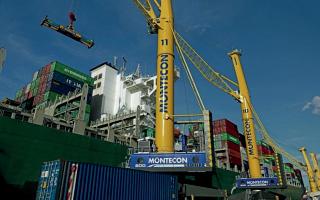
8 Montecon’s quayside handling power is
provided by specially adapted Liebherr LHM 800 mobiles – but what does the future hold for the company?
manoeuvre has created a monopoly situation in Montevideo.
Montecon used to be owned by the influential Schandy family but is now majority owned (since 2018) by the Chilean Ultramar group.
It published a lengthy letter in the influential El Pais and El Observador national newspapers making threats to “take actions to defend our right to work” in accordance with the “Law for the Defense of Free Competition, ratified by the [original] TCP Concession Law”.
Julio Branda, Commercial Manager, Montecon, told Port Strategy that shippers and port unions and many of the carriers are supportive of the company’s position as they do not want to see a monopoly develop. Indeed, Branda says the port unions have already carried out intermittent strike actions – both in the port and outside the government palace - against the government decision to favour TCP.
“If this goes ahead we will not be able to carry on,” said Branda. “There are not enough other types of cargoes to be viable.”
Montecon has been operating out of Montevideo’s public berths for more than 20 years and after Ultramar increased its shareholding began to be more adventurous in its strategies and investment plans.
In 2018 it won a bid for a 10-year concession to operate a 9000 sq m dry and reefer warehouse, with 700 reefer plugs to bolster beef, chicken and fruit shipments. Montecon says that it currently employs 700 workers, and during its 20 years of operations has invested $90m and paid ANP more than $100m in fees.
It has also been working very closely with Liebherr of Germany which has been designing specially adapted MHCs for Montecon. The Liebherr LHM 800, costing US$6million at the time, debuted at Montecon in 2018. They now have three of these.
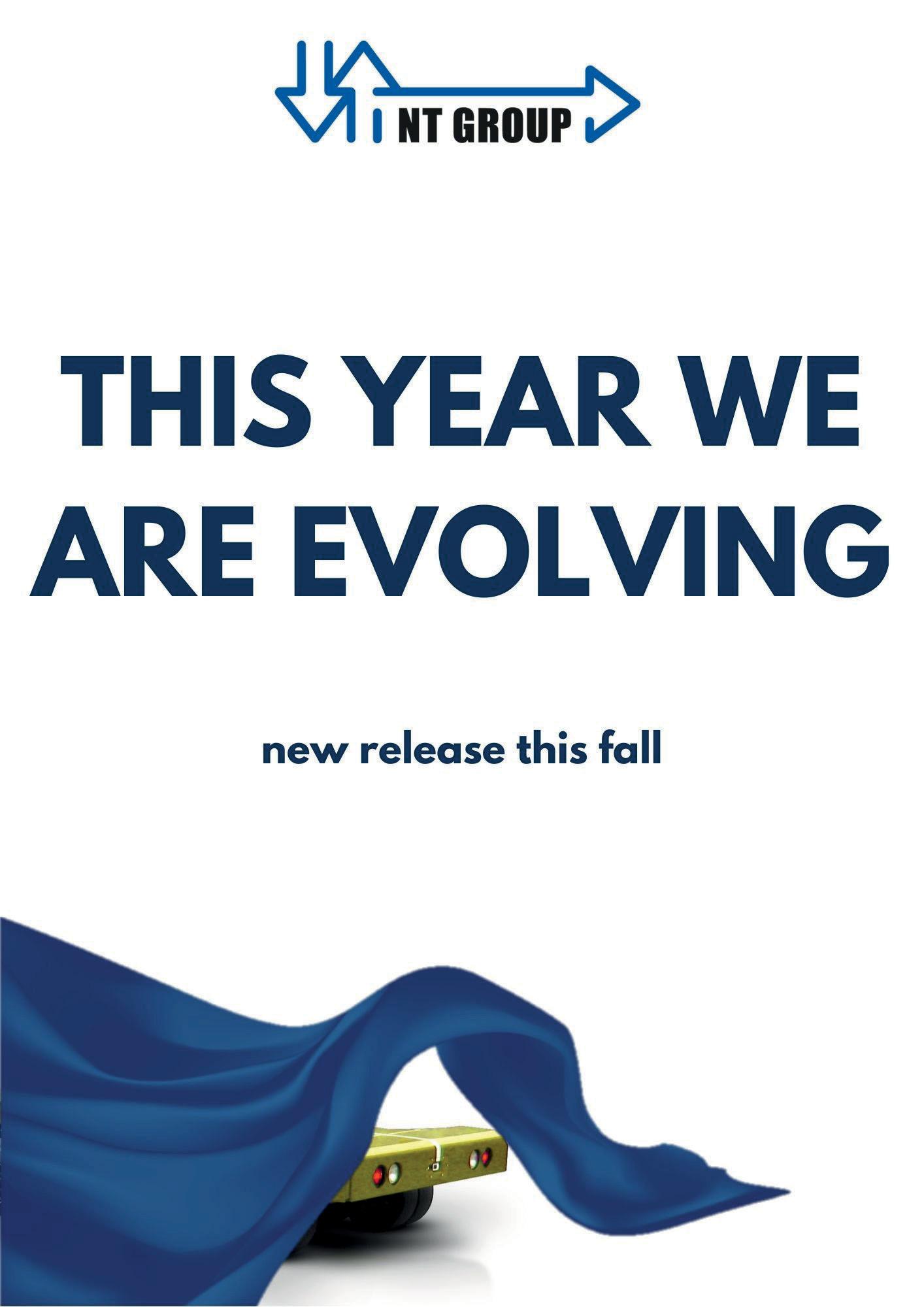
early June, switched back to the Uruguayan port and Hapag Lloyd, CMA CGM and “even MSC, who are partners in Exolgan in BA” are all in the process of doing so.
“Once one or two switch their transshipment it`s usually just a matter of time before they all do,” he forecasts. “It`s just more efficient that way. I think by mid-September about 70% of Paraguayan transshipment will have re-crossed the River Plate back to Montevideo.”
Given the new agreement between TCP and the government Hontou is also expecting more services to shift from Montecon back to TCP.
Today TCP has three regular deep-sea calls and one seasonal one.
One Montevideo based shipping agent who has worked closely with both Montecon and TCP over the past decade says that the current situation looks bad for Montecon, but he didn’t think it would be the end of them, despite their own gloomy prognostications.
“Maybe they will still have one, maybe even two, services left by the middle of next year – I am not sure TCP can handle all the cargo that is coming Montevideo’s way over the next few years,” he told Port Strategy. “TCP is increasing its Paraguayan movement now and so will need more space. I think, and sincerely hope, Montecon will keep at least one regular deep-sea call and be taking the overflow cargo from TCP for a good few years yet to come.”
Katoen Natie claims there will be no “monopoly” because the “competition” can come from BA and the southern Brazilian ports, not necessarily from within Montevideo.
According to Katoen Natie, TCP will have a capacity in excess of 2.5 million TEU once the $455m investment project is completed, more than double its present limit, and the aim is to increase today’s maximum draft of 11.5 metres at low tide (plus 0.9 metres at high tide) down to 14 metres by the end of the investment period; although that will also depend on further deepening of the Hidrovia waterway in the River Plate, which is partly down to Argentina.

8 Montecon is
presently on the losing end of a dispute with its competitor TCP but is persisting with a legal challenge to recent rulings

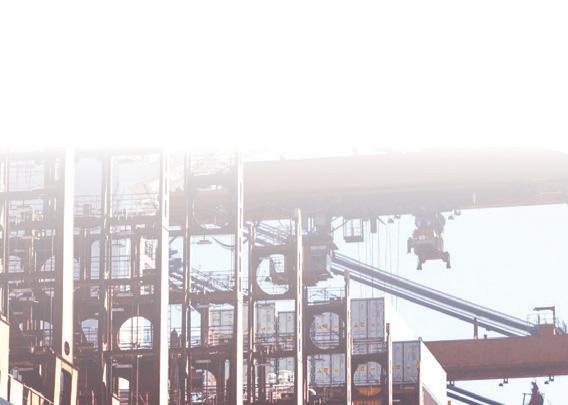
BOOK YOUR PLACE NOW!


Join us in 2021 at the proven meeting place to exchange the latest innovation in transoceanic zero-emission shipping, chaired by Lars Robert Pedersen, Deputy Secretary General, BIMCO, & Martin Kroeger, Managing Director, German Shipowners’ Association, VDR

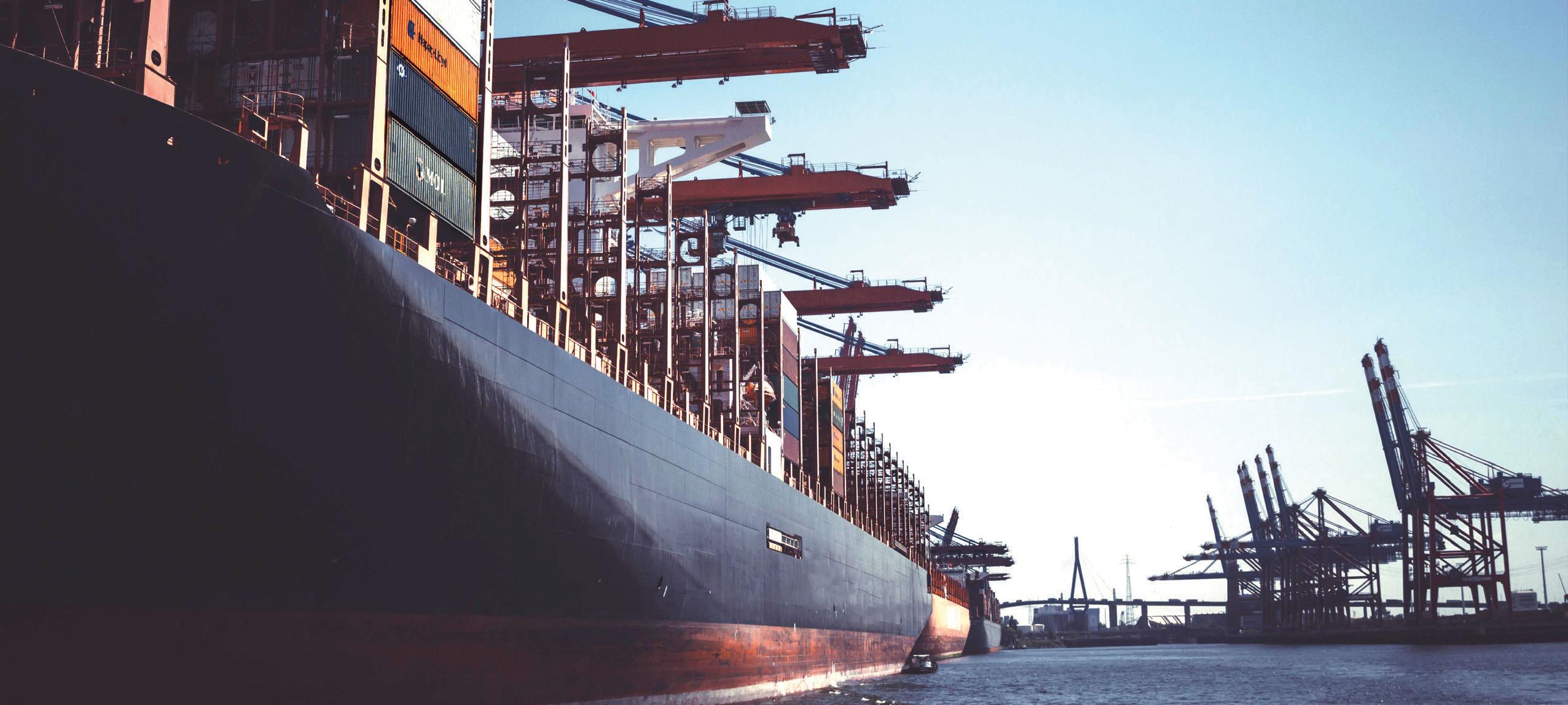
Get involved today!
senior management and technical directors
100
YEARS 2021
In association with headline sponsor:
2021 conference topics include:
5 EU Emissions Trading Scheme and Shipping (EU ETS) 5 5
HEADLINE SPONSOR SILVER SPONSOR
Meet and network with 200 CEOs and technical directors from ship owning, operating and management companies, and senior executives from For more information on attending, sponsoring or speaking contact the events team: visit: propulsionconference.com or contact: +44 1329 825335 or email: conferences@propulsionconference.com
MOTORSHIP










